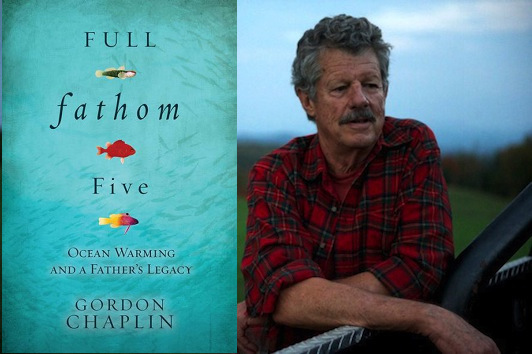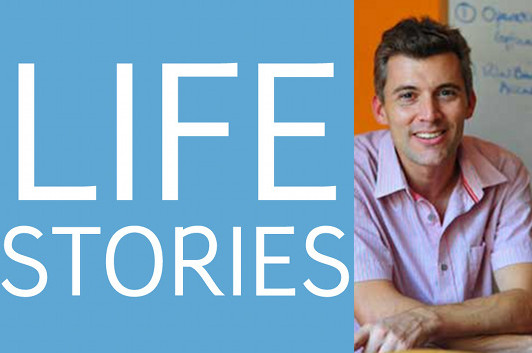Life Stories #54: Josh Ruxin
Subscribe to Life Stories in iTunes
Life Stories is a podcast series where I talk to memoir writers about their lives and the art of writing memoir. In this episode, you’ll meet Josh Ruxin, an international aid worker who moved to Rwanda eight years ago to set up a community-based program that would be a model for that nation’s economic recovery. The project was supposed to last two years, but he and his wife are still there—in fact, they’ve opened a restaurant that’s become one of the main attractions of the capital city of Kigali. In A Thousand Hills to Heaven, Ruxin tells the story of what drew him to Rwanda. In our conversation, we discussed his motivations for writing a memoir, which include setting down what he’s learned about creating economic aid programs that can lead to true self-sufficiency:
“On one hand, there are those who believe that if we just do more aid, more big aid, it’s going to solve everything in spite of evidence that most big aid actually hasn’t had much impact over the years. Then on the other side, you’ve got people who say all aid is bad and we just shouldn’t be doing it. And I came to realize, working with the government of Rwanda and of course working in the restaurant, that there is this middle ground–that, actually, there’s a lot we could be doing with aid that could be wildly effective and sustainable, and there’s a lot of lessons that can be learned from the private sector that should be applied through aid programs in order to make both public programs [and] the private sector thrive.”
We also talk about, among other things, the ways that contemporary Rwanda bears the memories of the brutal 1994 genocides—and the effort it’s making to become a different, better nation—and how his wife’s original idea for opening a coffee shop became a much bigger operation that either of them had anticipated. For those of you who’ve been listening to Life Stories for a while, if you enjoyed the interview with international relief worker Jessica Alexander, you’ll also appreciate Ruxin’s perspective on relief efforts in Africa—and, I later found out, the two of them actually come from the same town in Connecticut, and although they didn’t cross paths back then due to age differences, their fathers, both doctors, do know each other. Small world!
Listen to Life Stories #54: Josh Ruxin (MP3 file); or download this file by right-clicking (Mac users, option-click). Or subscribe to Life Stories in iTunes, where you can catch up with earlier episodes and be alerted whenever a new one is released. (And if you are an iTunes subscriber, please consider rating and reviewing the podcast!)
25 November 2013 | life stories |
Read This: Full Fathom Five

I recently met Gordon Chaplin to talk about his memoir Full Fathom Five, with an eye towards an episode of the Life Stories podcast. As sometimes (though fortunately not very often) happens, the sound on our recorded conversation wasn’t quite where I’d like it to be for public consumption, so that plan fell through—but I do hope that you’ll have a look at Chaplin’s story of picking up the legacy of his marine zoologist father, who co-authored the definitive Fishes of the Bahamas and Adjacent Tropical Waters. As a young boy, Chaplin actually helped his father with some of the research; fifty years later, he was invited to return to the Bahamas (although there was a period when, having been busted for possession, he was banned from the country) to see how aquatic life in the region had changed.
Full Fathom Five isn’t Chaplin’s first memoir; in Dark Wind (1999), he writes about attempting to sail across the Pacific with his first wife and losing her during a typhoon. They were holding on to each other through the storm, when she slipped out of his grasp and into the water; he’s still haunted by the choice not to keep plunging under the waves to try to find her, even though he knows rationally that he almost certainly would have died as well if he had. “Every time I go in the water, I feel close to Susan,” he told me, and that’s one of the reasons he took the title for this book from a passage in The Tempest that was recited at her funeral. That led us to a discussion of the allure of the dropoff, the point in the underwater topography at which the bottom suddenly plunges, like the face of a cliff. “I think that pull is stronger for me than it is for most divers, because I have these—I won’t call them ghosts,” he said, “but I do have a feeling that if I went down there, I might find the people I’ve lost.”
Chaplin also revealed how writing Full Fathom Five led to discoveries and realizations about his parents’ relationship that he probably wouldn’t have made otherwise. “I read all of my father’s diaries, I read his field notes, I read all of my mother’s diaries,” he recalled. “I read every single account I could find of my family, none of which I’d read before.” The biggest revelation may have been about his father’s transformation from a poor but adventurous young man who married into money and was recast as a rich woman’s consort. But he was sensitive to being branded as a gold digger, and refused to settle for that life. “Instead, he developed himself into a world-class scientist,” Chaplin explained, “and I hadn’t appreciated how that happened. I still don’t quite understand how it happened, but I can see now that it did. Before, I hadn’t respected that change [in his life] nearly as much as I do now.”
22 November 2013 | read this |


 Our Endless and Proper Work is my new book with Belt Publishing about starting (and sticking to) a productive writing practice.
Our Endless and Proper Work is my new book with Belt Publishing about starting (and sticking to) a productive writing practice. 
